Our NHB has habit of throwing surprises like proverbial free worms. Since Oct 16 last year, the National Museum of Singapore (NMS) ran an exhibition titled Pompeii: Life in a Roman Town 79CE priced at $12 for adults, $6 for Senior and NSF and free for students and children. Suddenly without warning, like Mount Vesuvius the protagonist in the Pompeii story, it was announced that admission would be free during the two weekends before the exhibition ends on Jan 23. In effect it was an undeclared Open House as I were to discover in NMS: admission to other galleries were free too!
Out of curiosity, I checked Google Map for Pompeii (indicated by the marker, bottom right) and woah, there is really a crater nearby. Mount Vesuvius the volcano is less than 10km from Pompeii.
I first knew of Pompeii not from the exhibition but from a children trivia book. The trivia is still etched in my mind after many years. I think it goes like, "Which town literally disappeared overnight?" Answer: Pompeii. From the exhibition, I learnt the eruption also buried neighboring towns like Herculaneum and Oplontis.
While the exhibition features 279 artefacts on loan from Italy (from Melbourne Museum was loaned some volcanic samples), the "exclusive" to take away must be the body casts of Vesuvius' victims. Artefacts from archaeological digs abound but how often do you see body casts looking like actual bodies lying around?
Body cast or actual body? This must be the most lifelike cast in the whole exhibition!
In fact the body casts are the first exhibits to greet you in the gallery. They must have raised quite a few questions and to indemnify the museum against possible nightmares, the gallery guide advises parents to "accompany their children if they find them unsettling".
Pompeii exhibition with its magnificent cast greets you at the gallery entrance.
It is not a morbid fascination but people still gape at the casts. 2000 years ago, these folks would not have imagined they would become exhibits one day.
Who is this crouching man? My first impression was he resembled a victim of another recent volcanic eruption in Indonesia - Mbah Maridjan, spiritual guardian of Mount Merapi.
How would a slave or criminal escape? This shackled man couldn't. The pyroclastic surge overcame him as he was struggling to reach one of the town gates.
Even pigs and dogs were not spared. The guard dog actually died from suffocation as it tried to escape by climbing higher until the chain ran out.
Left: You can see the man was trying to avoid suffocation by covering his mouth.
Right: Till death do us part. The couple was together even in death.Judging from the crowd, the exhibition was a success and I was a little amused to see many Caucasians among them. Might some of them be Italians? Pompeii is a town in Europe Italy after all and kudos to the organizers for transplanting a part of it to Singapore. After the body casts, visitors are introduced to Mount Vesuvius, the town of Pompeii and a Roman atrium house. We get to know how life was like in a Roman town in 79CE when Mount Vesuvius erupted.
It was a photographer's field day thanks to the museum's enlightened policy of no-flash photography. Many were happily snapping away, me included. Enjoy the rest of my photos!
Pros at work. I like particularly the little girl in the middle photo. While her camera is anything but pro, her meticulousness in documenting all the exhibits gained my admiration (just look at how her eyes are fixated on the LCD viewer - absolute concentration).
European visitors might be a little surprised seeing Pompeii in Singapore. Could the two ladies be Italians?
Sense of Awe
Funerary statue looks on and a Muse contemplates. Check out the statue from the front. The Muse is Polyhymnia, Muse of lyric poetry and singing.
The last section in the exhibition is a reference section. You see many books on Pompeii chained to the long display table. There is also a children's interactive space - proof that the exhibition is family friendly - where kids get to make gladiator helmet and play with a 3D cardboard display.
Bacchus giving thumbs up .... something is not up yet, thankfully. Bacchus is the god of wine and was highly venerated in Pompeii. For something more feminine, check out my shot of Venus, the goddess of love.
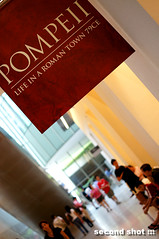
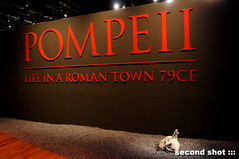

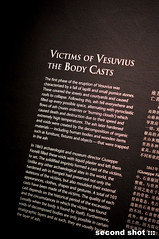
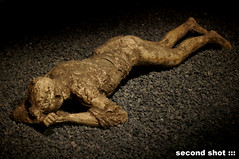
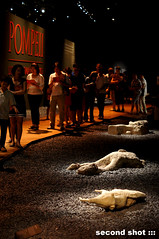
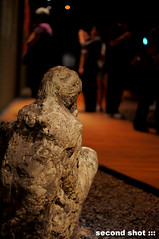
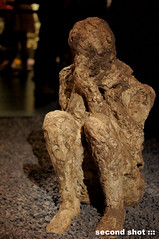
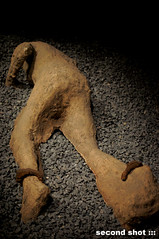
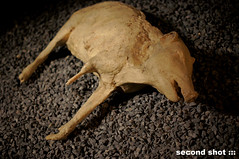
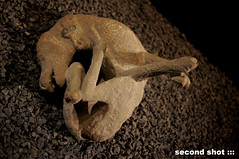
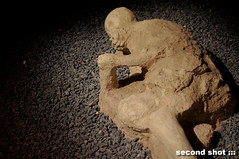
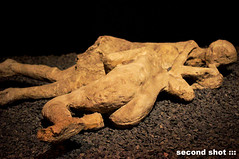

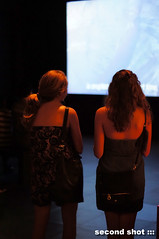

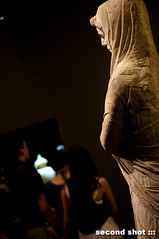
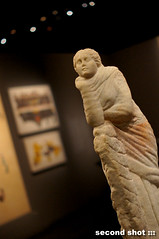
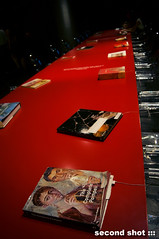
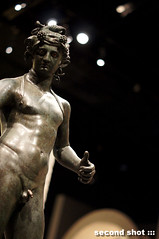
Hmm… it seems like the crouching man was either praying or covering his nose.
ReplyDeleteYup he was trying to cover his nose
ReplyDelete